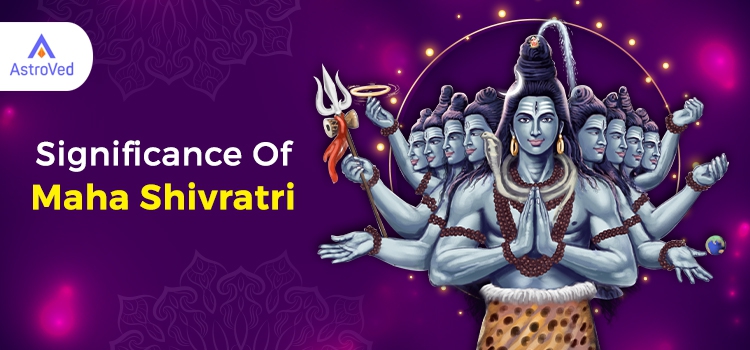Significance Of MahaShivratri
Shivaratri is an important festival, considered to be highly auspicious for the worship of Lord Shiva. It is Shiva ratri, that is, the Night of Shiva and is meant for praying to the Lord. Shivaratri is actually a monthly occurrence, which takes place on every 13th or 14th night of the dark fortnight of Krishna Paksha, which also happens to be the night before Amavasya, the New Moon day. The greatest of such monthly Shivaratri is known as Maha Shivaratri, a day considered to be extremely sacred for the worship of Lord Shiva. This falls in the Hindu month of Phalguna or the Tamil month of Masi (February–March).
Participate In The Rituals Of Maha Shivaratri to Receive the Blessings of peace, prosperity and happiness!
Mythological importance of Maha Shivaratri
Many are the ancient legends that make a mention about Maha Shivaratri. Whereas, Linga Purana, Skanda Purana and Padma Purana speak in detail about the occasion, they give different accounts about its importance. While some regard this as the night when the Lord performed Shiva Thandava, his cosmic dance, a few others hold this as the occasion when the divine couple Shiva and Parvati got married.
However, the most popular legend on
Maha Shivaratri speaks about the great feat that Shiva performed on this day. Once, the Devas and Asuras churned the great ocean for getting Amrut, the elixir of immortality. However, what emerged first was the deadly poison Halahala, which had the potential of destroying the entire universe. While everyone panicked and started running for cover, Shiva stepped in immediately, simply consumed the lethal concoction and thus, protected the world from total annihilation. However, at the instance of his consort Parvati, the poison stopped at his throat itself, which thus became blue and hence, Shiva came to be known as Neelkanth, the blue-throated Lord. The grateful beings hailed the Lord and started observing Maha Shivaratri as an expression of their intense gratitude to their great savior.
Importance of Maha Shivaratri
The greatest significance of
Maha Shivaratri lies in the belief that this occasion has the efficacy of wiping out all the accumulated sins of an individual. This,
Lord Shiva himself is said to have declared categorically to his consort Parvati, when she wanted to know what was the worship that pleased him to the greatest level. It is hence, firmly believed by the devotees that observing austerities on Maha Shivaratri and offering worship to the Lord with devotion can absolve the devotees of all sins and bestow them with Moksha, the ultimate state of liberation.The word Shiva itself means “that which is not,” which embodies all that we do not see, the unknown and the darkness. Although light represents the seen world, most of our existence remains in the unseen world. Lord Shiva is the creator and the destroyer, and hence worshipping him is to seek his blessings to understand that which is unknown. Maha Shivratri eliminates ignorance, guides towards the light of knowledge, makes one aware of the universe, ushers in the spring, and invokes the supreme power and his blessings.
Maha Shivaratri Worship
Observing
Vrat (fasting) forms a very important aspect of Shivaratri worship. Many people observe complete fasts during the day and also in the night of Shivaratri, remain awake right through, and spend all their time in meditating, reading, singing and hearing about the glories of Shiva. While people offer worship to the Lord at home, a very large number of people flock to Shiva temples, especially during Shivaratri night and offer prayers to him. Shiva is believed to be very fond of Abishekam or hydration ceremony and grand rituals are held in the temples in the night when sacred baths are given to Shiva Lingas with materials like milk, coconut water, honey, water etc. amidst the chanting of sacred hymns. This occasion holds immense significance for women too, who perform austerities and do worship seeking the blessings of
Goddess Parvati. It is believed that, while married women will be bestowed with a long and blissful married life, the unmarried will be blessed with good husbands who are as virtuous as Shiva himself.Devotees not only perform rituals but also meditate on certain qualities such as honesty, self-control, and forgiveness.
To mark this day, people worship and read Shiva Purana, but what they ignore is the fact that this holy book has great importance and must be worshipped as per rules mentioned in Vedas. In Atharveda, one such occasion is mentioned; when Sage Shaunak requested Suta to enlighten him about the auspicious rules of reading and worshiping Shiva Purana. He said: Only if the devotees worship and follow the holy rituals of Shiva Purana, then they can receive the auspicious blessings of Goddess Parvati and Lord Shiva. He further said: One must seek a proper ‘mahurat’ from a sage, priest or an astrologer to begin reading Shiva Purana. Then, they must invite guests to listen to the holy verses in a clean and sacred place.
Before beginning with Shiva Purana reading, ensure a clean and sacred place, preferably a puja room at home. It is best to read it near Shivalinga or Shiva temple. The person who is telling the story or 'Katha' should be facing north, and all the listeners should sit facing east. The person who is telling the 'Katha' should be a scholar and should be capable of clearing all the doubts from the listener's mind. A devotee should also make donations and offerings according to his capacity and capability. The Mantra '
OM NAMAH SHIVAY' should be chanted throughout the Katha.




















